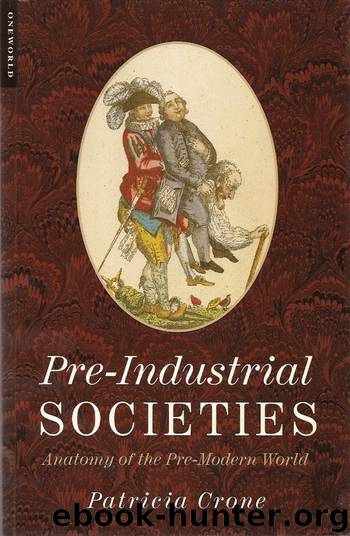Pre-Industrial Societies by Crone Patricia

Author:Crone, Patricia
Language: eng
Format: epub
Publisher: Oneworld Publications
7
Religion
I should like to round off this part of the book with some general comments on religion. Religion is a distinctive part of culture which generates more bewilderment in modern students than any other aspect of history: some find it difficult to see why it should exist at all, while others take its existence for granted without understanding how it can be related to historical processes, religious truth being in their opinion above worldly change; and all are hampered in their understanding by the fact that religion occupied a very different position in agrarian civilizations from that which it has in the modern West. How and why the role of religion has changed under industrial conditions will be dealt with in the last chapter. Here I shall try to explain why it exists and to dispel some of the most common misconceptions about it.
What is religion?
A religion is a world view, that is a set of ideas which add up to a theoretical construction of the world, or key parts of it. The ideas may be presented in primitive myths or in sophisticated theological systems. Either way, religions differ from ideological, philosophical and moral world views in that they explain the world with reference to supernatural beings rather than abstract principles or impersonal laws. Usually they also have a broader scope, covering all aspects of life here and now as well as the hereafter, whereas ideological, philosophical and moral systems often (though not always) concentrate on specific aspects of this world such as politics, social order or health and ignore or deny the existence of afterlife altogether. But in the present context these differences are immaterial. Religions have been more popular in history than their atheist or non-theist counterparts, presumably because supernatural beings endowed with human feelings are easier to understand, love and obey than abstract concepts such as cosmic order, karma or proletarian struggle, which operate like machines without regard for their effect on human beings and which are hard to visualize. But whatever the reasons for the greater appeal of theist world views, the question why people have religions, philosophies, ideologies or moralities is one and the same. In what follows the term ‘religion’ should be taken to mean any such world view, or all of them, unless the contrary is explicitly stated.
Such world views are however quite distinct from modern science. Modern science also offers a theoretical construction of the world, but it does not engage in any moral evaluation whatsoever, with the result that it never adds up to a prescription: it never ells you what to do. By contrast, religions and comparable world views are invariably prescriptive: they identify this as good and that as bad, and tell you to do this as opposed to that if you want to achieve success, righteousness, salvation, or whatever. Religion is not necessarily concerned with otherworldly salvation (this concern being unique to the salvation religions, broadly synonymous with world religions); but whether uniquely concerned with this world or with the next, or jointly with both, it is always concerned with approved behaviour.
Download
This site does not store any files on its server. We only index and link to content provided by other sites. Please contact the content providers to delete copyright contents if any and email us, we'll remove relevant links or contents immediately.
| Africa | Americas |
| Arctic & Antarctica | Asia |
| Australia & Oceania | Europe |
| Middle East | Russia |
| United States | World |
| Ancient Civilizations | Military |
| Historical Study & Educational Resources |
Cecilia; Or, Memoirs of an Heiress — Volume 1 by Fanny Burney(32558)
Cecilia; Or, Memoirs of an Heiress — Volume 2 by Fanny Burney(31956)
Cecilia; Or, Memoirs of an Heiress — Volume 3 by Fanny Burney(31942)
The Secret History by Donna Tartt(19092)
Sapiens: A Brief History of Humankind by Yuval Noah Harari(14390)
Leonardo da Vinci by Walter Isaacson(13337)
The Radium Girls by Kate Moore(12029)
Sapiens by Yuval Noah Harari(5372)
How Democracies Die by Steven Levitsky & Daniel Ziblatt(5219)
The Wind in My Hair by Masih Alinejad(5095)
Homo Deus: A Brief History of Tomorrow by Yuval Noah Harari(4918)
Endurance: Shackleton's Incredible Voyage by Alfred Lansing(4783)
Man's Search for Meaning by Viktor Frankl(4607)
The Silk Roads by Peter Frankopan(4535)
Millionaire: The Philanderer, Gambler, and Duelist Who Invented Modern Finance by Janet Gleeson(4479)
The Rape of Nanking by Iris Chang(4214)
Joan of Arc by Mary Gordon(4115)
The Motorcycle Diaries by Ernesto Che Guevara(4102)
Stalin by Stephen Kotkin(3969)
